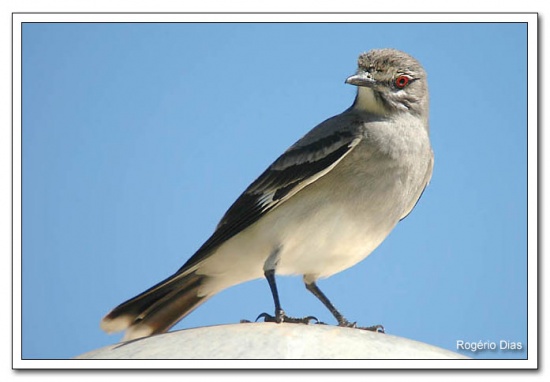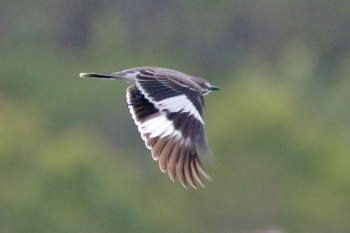m (Grey Monjita moved to Gray Monjita: grey/gray issues) |
Sbarnhardt (talk | contribs) (Amend Gsearch, Add Gsearch checked template) |
||
| (10 intermediate revisions by 3 users not shown) | |||
| Line 1: | Line 1: | ||
| − | + | [[Image:Grey_Monjita.jpg|thumb|550px|right|Photo by '''[http://www.birdforum.net/member.php?u=44584 Rogerio Araújo Dias]''' <br />[[Brazil]]]] | |
| − | + | ;[[:Category:Nengetus|Nengetus]] cinereus<br /> | |
| − | [[Image:Grey_Monjita.jpg|thumb|550px|right|Photo by Rogerio | + | ''Xolmis cinerea''<br /> |
| + | ''Xolmis cinereus'' | ||
==Identification== | ==Identification== | ||
| + | 22·5–23 cm<br /> | ||
| + | Ashy-grey above with white above the lores. The wings are mostly black with a white speculum when at rest which is seen as a very conspicuous white "V" in flight. The tail is black with a broad white tip. | ||
| + | The throat is white with a broad dark grey malar stripe while the breast is ashy-grey and the belly is white. | ||
==Distribution== | ==Distribution== | ||
| + | In [[South America]] they are found in the ranges noted under the subspecies below. | ||
==Taxonomy== | ==Taxonomy== | ||
| + | [[Image:16216Grey-Monjita.jpg|thumb|350px|right|Photo by {{user|arthurgrosset|arthurgrosset}}<br />Chapada Diamantina, Bahia, [[Brazil]], July 2002 ]] | ||
| + | This is a [[Dictionary_P-S#P|polytypic]] species<sup>[[#References|[1]]]</sup> consisting of 2 subspecies. | ||
| + | ====Subspecies==== | ||
| + | *''N. c. cinereus: | ||
| + | :*[[Suriname]]; Amazonian and eastern [[Brazil]], [[Uruguay]] and north-eastern [[Argentina]] | ||
| + | *''N. c. pepoaza'': | ||
| + | :*South-eastern [[Peru]] (Madre de Dios) to eastern [[Bolivia]], [[Paraguay]] and northern [[Argentina]] | ||
| + | |||
==Habitat== | ==Habitat== | ||
| + | Grasslands with scattered trees and cerrado; city parks. | ||
==Behaviour== | ==Behaviour== | ||
| + | ====Diet==== | ||
| + | Their diet consists of insects. They sit on an open perch and drop to the ground to catch their prey. | ||
| + | ==References== | ||
| + | #{{Ref-Clements6thAug13}}#Avibase | ||
| + | #Handbook of the Birds of the World Alive (retrieved May 2014) | ||
| + | {{ref}} | ||
==External Links== | ==External Links== | ||
| − | {{GSearch| | + | {{GSearch|Nengetus+cinereus}} |
| − | + | {{GS-checked}} | |
| − | [[Category:Birds]] [[Category: | + | [[Category:Birds]] [[Category:Nengetus]] |
Latest revision as of 16:40, 9 July 2022
- Nengetus cinereus
Xolmis cinerea
Xolmis cinereus
Identification
22·5–23 cm
Ashy-grey above with white above the lores. The wings are mostly black with a white speculum when at rest which is seen as a very conspicuous white "V" in flight. The tail is black with a broad white tip.
The throat is white with a broad dark grey malar stripe while the breast is ashy-grey and the belly is white.
Distribution
In South America they are found in the ranges noted under the subspecies below.
Taxonomy
This is a polytypic species[1] consisting of 2 subspecies.
Subspecies
- N. c. cinereus:
- N. c. pepoaza:
Habitat
Grasslands with scattered trees and cerrado; city parks.
Behaviour
Diet
Their diet consists of insects. They sit on an open perch and drop to the ground to catch their prey.
References
- Clements, J. F., T. S. Schulenberg, M. J. Iliff, B.L. Sullivan, C. L. Wood, and D. Roberson. 2013. The eBird/Clements checklist of birds of the world: Version 6.8., with updates to August 2013. Downloaded from http://www.birds.cornell.edu/clementschecklist/download/
- Avibase
- Handbook of the Birds of the World Alive (retrieved May 2014)
Recommended Citation
- BirdForum Opus contributors. (2024) Gray Monjita. In: BirdForum, the forum for wild birds and birding. Retrieved 6 May 2024 from https://www.birdforum.net/opus/Gray_Monjita
External Links
GSearch checked for 2020 platform.





